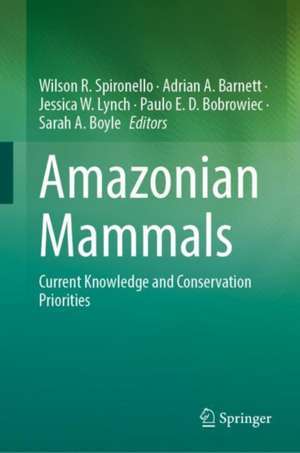Amazonian Mammals: Current Knowledge and Conservation Priorities
Editat de Wilson R. Spironello, Adrian A. Barnett, Jessica W. Lynch, Paulo E. D. Bobrowiec, Sarah A. Boyleen Limba Engleză Hardback – 30 ian 2024
Preț: 1014.89 lei
Preț vechi: 1237.67 lei
-18% Nou
Puncte Express: 1522
Preț estimativ în valută:
194.20€ • 211.61$ • 163.64£
194.20€ • 211.61$ • 163.64£
Carte tipărită la comandă
Livrare economică 24 aprilie-08 mai
Preluare comenzi: 021 569.72.76
Specificații
ISBN-13: 9783031430701
ISBN-10: 3031430700
Pagini: 489
Ilustrații: XIII, 489 p. 80 illus., 65 illus. in color.
Dimensiuni: 155 x 235 mm
Greutate: 0.88 kg
Ediția:1st ed. 2023
Editura: Springer International Publishing
Colecția Springer
Locul publicării:Cham, Switzerland
ISBN-10: 3031430700
Pagini: 489
Ilustrații: XIII, 489 p. 80 illus., 65 illus. in color.
Dimensiuni: 155 x 235 mm
Greutate: 0.88 kg
Ediția:1st ed. 2023
Editura: Springer International Publishing
Colecția Springer
Locul publicării:Cham, Switzerland
Cuprins
Why This Book on Amazonian Mammals Is Needed.- Xenarthrans of Brazilian Amazon: Recent Discoveries, Knowledge Gaps, and Conservation Concerns.- Biodiversity and Conservation of Bats in the Brazilian Amazonia - With a Review of the Last 10 Years of Research.- Primates of Brazilian Amazonia: Knowledge, Research Gaps and Conservation Priorities.- Claws and Fangs: Carnivore Abundance and the Conservation Importance of Amazonia.- Mammalian Megafauna: A Cross-continental Comparison in Research Output.- Amazonian Aquatic Mammals: Existing Knowledge, Current Threats and Future Studies.- Historical Commercial Hunting of Mammals in Amazonia.- Subsistence Hunting and Wild Meat Trade.- Management of Subsistence Hunting of Mammals in Amazonia: A Case Study in Loreto, Peru.- Showing and Saving: The Challenges and Opportunities of Mammal-based Tourism in Brazilian Amazonia.- Large-scale Land-use Changes and the Amazonian Mammal Biota.- Habitat Fragmentation Impacts on Amazonian Non-volant Mammals.- Bat Responses to Anthropogenic Forest Fragmentation: Insights from an Amazonian Fragmentation Experiment in Brazil.- Infectious Diseases: A Threat to the Conservation of Amazonian Mammal Species.- Mining Impacts on Aquatic Mammals of the Brazilian Amazon.- Chapter Effects of Anthropogenic Climate Change on Ecosystems and Biodiversity, Especially on Amazonian Mammals.- Conservation Strategies for Mammals in Brazilian Amazonia: Future Studies at Local, Regional and Global Scales.
Notă biografică
Wilson R. Spironello has published nearly 70 peer-reviewed articles and book chapters, and has peer-reviewed for journals with ecology and conservation focus. He has a degree in Ecology from Universidade Estadual Paulista Julio de Mesquita Filho, Brazil, and PhD in Biology from University of Cambridge, England. He is currently a researcher at National Institute of Amazonian Research - INPA, in the Brazilian Amazon. In a 40-year research career in the Amazon, his studies have included plant ecology, ecology and management of timber species, primate ecology, and the ecology and population monitoring of medium and large terrestrial and arboreal mammals. He was president of the Brazilian Society of Primatology from 2014-2015.
Jessica W. Lynch is a Professor at University of California, Los Angeles in the Institute for Society and Genetics and Department of Anthropology, where she teaches courses on Amazonia in the Anthropocene; Human-Animal Interactions; and Primate Genetics, Ecology and Conservation. She received her Ph.D. in Biological Anthropology at University of Wisconsin, Madison. She is a member of the IUCN Primate Specialist Group and Editor-In-Chief for the journal Neotropical Primates. Lynch’s expertise centers on the evolution of behavioral and morphological diversity in mammals in the Americas. Her research focuses most strongly on understanding the diversity within capuchin monkeys (Sapajus and Cebus), and incorporates phylogenomic and biogeographic analyses.
Paulo Estefano D. Bobrowiec is a bat researcher at the National Institute for Amazonian Research (INPA) and the Biological Dynamics of Forest Fragments Project (BDFFP) who has published over 60 peer-reviewed articles and book chapters. He undertook a BSc in Biological Sciences at the Federal University of Uberlândia, a PhD in Genetics, Conservation and Evolutionary Biology, both at INPA, and a second PhD in Zoology at the Federal University of Amazonas. He has worked in the Brazilian Amazon for 22 years and his main area of expertise is bat ecology, community structure and conservation (forest fragmentation and dams flooding).
Sarah A. Boyle has conducted research on the behavior, ecology, and conservation of Amazonian mammals, with a focus on non-human primates, for the past 20 years. She has published more than 50 scientific articles and book chapters. She has a degree in Anthropology from the College of William and Mary, Virginia, USA and a PhD in Biology from Arizona State University, Arizona, USA.
Textul de pe ultima copertă
The mammal fauna of the Brazilian Amazon is one of the most diverse on Earth with over 450 known species. Bringing together more than 70 of the world’s top experts on Amazonian mammals, this book unites, for the first time, up-to-date data on the current state of knowledge on the ecology of all groups of non-rodent mammals in the Brazilian Amazon, analyses the effectiveness of current conservation programmes and identifies research and conservation priorities for the future.
Caracteristici
A unique volume on existing ecological knowledge and current conservation practices A book that is a practical guide to priorities of future research A dynamic guide that can be used by ecologists, conservationists, stakeholders, and mammalogists
